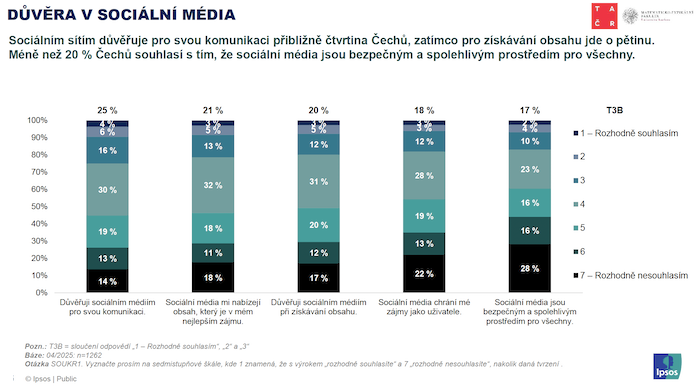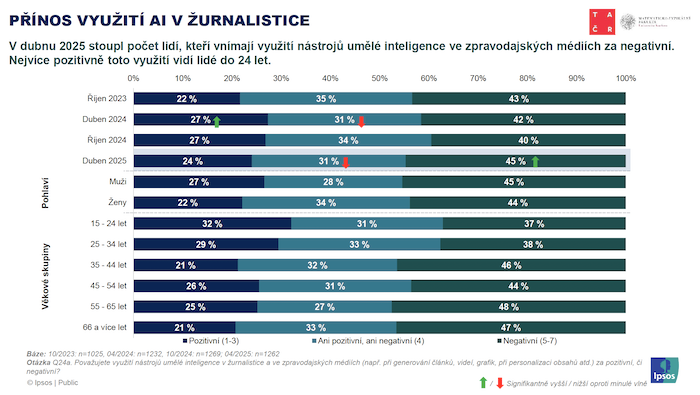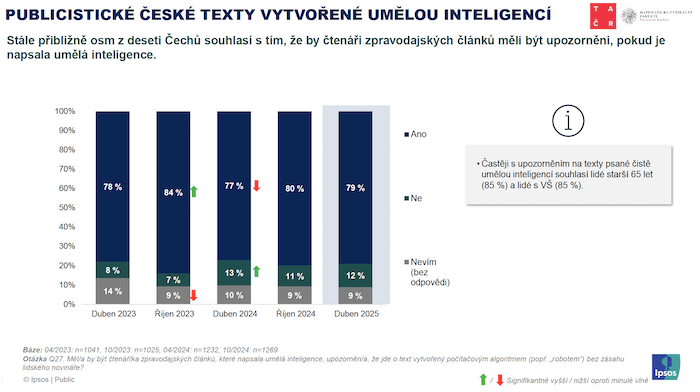Artificial intelligence is gradually finding its role in journalism. However, less than half (45%) of Czechs view the use of AI in news reporting negatively, with only younger generations viewing it more favourably. As many as 79% of the population believe that readers should be informed if a news story was written by AI without the involvement of a journalist. And if people had a choice, 73% would prefer news reporting by a human journalist. This is shown by a study by the Faculty of Social Sciences at Charles University, which was conducted in collaboration with the Ipsos agency on a sample of 1,262 respondents over the age of 18.
Most Czechs are sceptical about privacy on social media
Half of the population watches the news on television at least once a day, similar to online news portals (48%). The majority (59%) of residents say they usually seek information from multiple sources.
Social networks have been used by around 64% of Czechs for a long time, more often by young people under 24 and women. A fifth of users have their profile and content completely public. Communication platforms such as WhatsApp or Messenger are used daily by 65% of people.
When it comes to privacy on social media, six out of ten Czechs express doubts about whether it makes sense to strive for privacy on the internet at all. More than half of those surveyed confirm feelings of insecurity, vulnerability, lack of protection and exposure to risk in connection with personalised content on social media.

Knowledge and use of artificial intelligence
Some Czechs are already familiar with artificial intelligence. The ChatGPT chat system has been tried by 36% of the Czech population, confirming a slight upward trend from previous waves. The most experience with it is among young people under 24 (81%) and university graduates (53%).
ChatGPT was most often used out of curiosity, to find out what it can do (81%). It was mostly rated as useful (76%). Nevertheless, 40% of people believe that it will have no impact on their work within the next five years. The greatest impact is expected on the professions of graphic designers, software engineers and journalists.
In journalism, it will be more of a hybrid relationship between robots and humans
In journalism itself, according to 58% of Czechs, artificial intelligence will not replace journalists in the next five years, but rather it will be a hybrid relationship between robots and humans.
Almost a third of people say they have sufficient information about artificial intelligence. This is more often claimed by men and people under 44. However, only among people under 24 is this agreement above 50% (56%).
The use of AI in news reporting is viewed negatively by 45% of people, with those under 24 being the most positive about its use.

Approximately eight out of ten Czechs agree that readers of news articles should be notified if they were written by artificial intelligence. Compared to previous surveys, there has been a slight decrease in the number of people who would choose news created by artificial intelligence. This represents approximately one tenth of the Czech population.

Twenty-seven percent of Czechs view technological progress positively, while 32% view it negatively. The greatest concerns about AI relate to the decline in human communication (91%), misuse by governments (90%) and misuse by people themselves (89%). More than 70% agree that AI systems must comply with ethical and legal standards, respect user privacy and be transparent. A full 78% of the population considers the misuse of AI to be a significant risk to humanity.
"Perceptions of the use of artificial intelligence tools have deteriorated slightly compared to last year, which may have several causes. First and foremost, young people are becoming more familiar with the ethical and practical issues that AI can cause, including disinformation and potential manipulation through so-called deepfakes. Awareness of the risks associated with technological progress is also increasing, which is also leading to more general scepticism. In addition, as AI has gradually become more familiar and a more common part of life, people are starting to focus more on its potential negative impacts rather than on how innovative and fascinating the technology is," says Michal Kormaňák, Director of Ipsos Public Affairs.
The research was conducted by Ipsos for Charles University, Project TQ01000100 Newsroom AI: public service in the era of automated journalism, supported by the SIGMA TA ČR programme.
Source: mediaguru.cz

